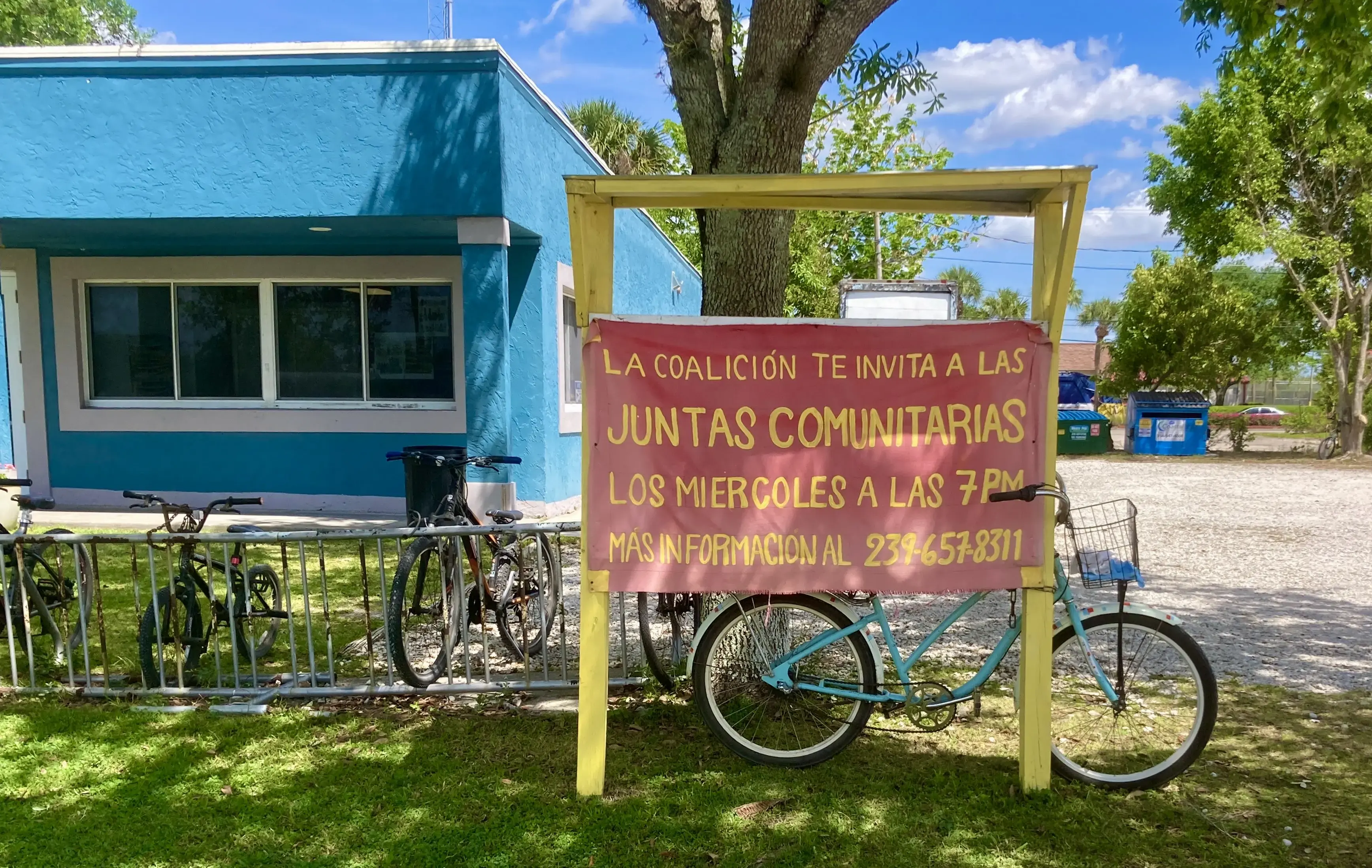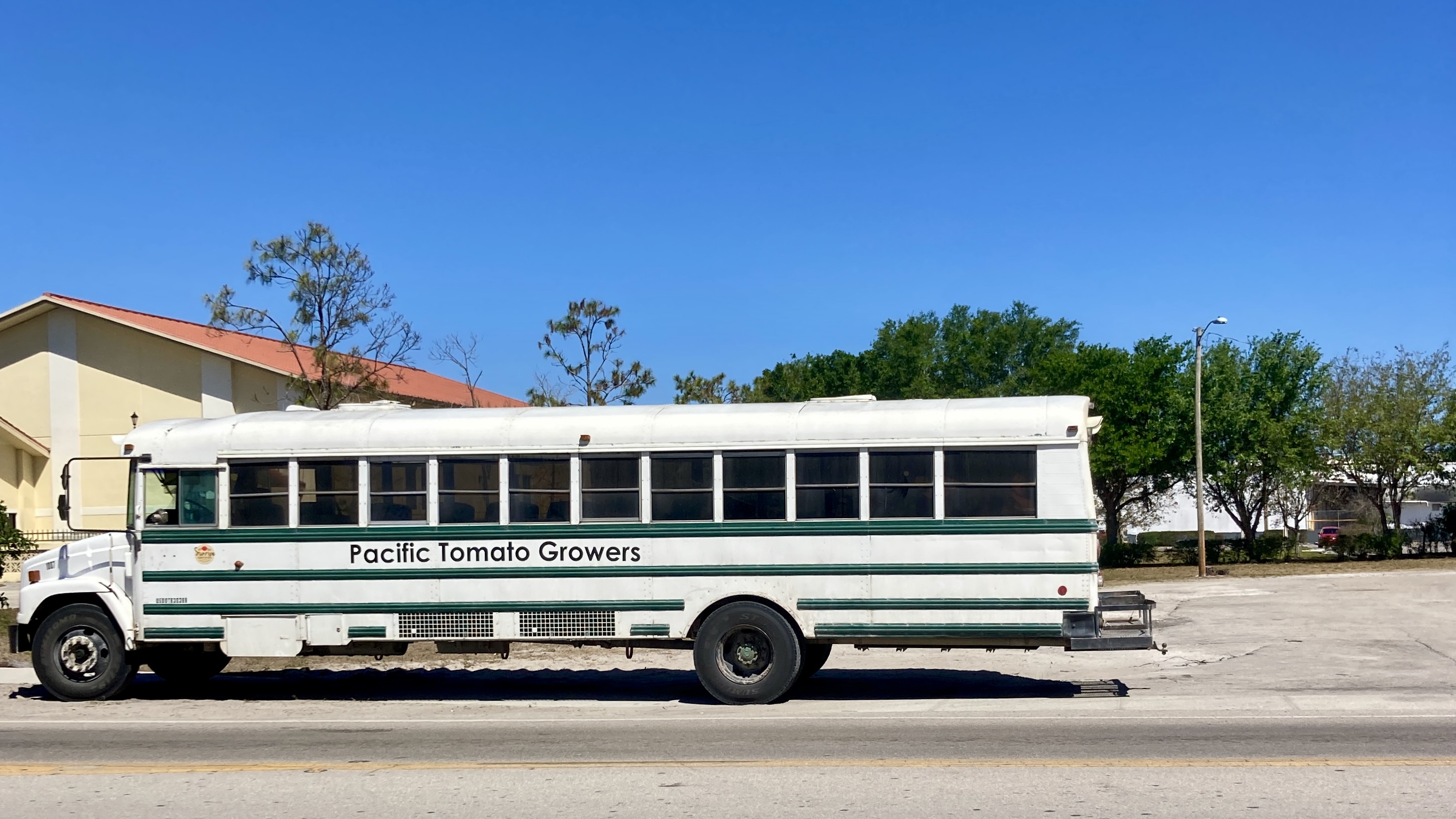
I first learned about the Coalition of Immokalee Workers (CIW) in 2020 while reporting on health information access for California farmworker communities during the pandemic. When I moved to Washington, D.C., in 2021, a table of iconic “Boycott Wendy’s” stickers popped up at my neighborhood farmer’s market, nodding to the Coalition’s landmark Fair Food Program to increase wages and rights for farmworkers (in which Wendy’s has refused to take part).
Built upon years of marches, rallies and hunger strikes, the Coalition has become a well-known leader in organizing for human rights and labor justice since 1993. When I came to Immokalee in Collier County, Florida, to start reporting for this project, I wanted to go behind the high-profile headlines to see how the Coalition actively empowers and informs its local community members on a daily basis.
One afternoon after arriving in Florida, I sat listening to Radio Conciencia 107.7 FM, the Coalition’s community radio station. A radio host reminded listeners in Spanish, “Here is the invitation for everyone, from the youngest to the oldest, to the Wednesday meeting here at the Coalition’s office,” adding, “It’s not just for workers who work in agriculture, but for all workers that are here in our community and for anyone who wants to come.”
So the next day, when I met with members of the Coalition, I asked if I could observe the meeting.

As a nonprofit journalism organization, we depend on your support to fund more than 170 reporting projects every year on critical global and local issues. Donate any amount today to become a Pulitzer Center Champion and receive exclusive benefits!
I arrived just as a storm broke. The Coalition’s door stood open, welcoming in community members. A movie played as people gradually trickled in, greeting one another and spreading throughout rows of chairs in the Coalition’s common space. A weekly tradition, this Wednesday’s selection was El hijo de Dios, or The Son of God. One Coalition member told me the movie aimed to help attendees continue their traditions during the time leading up to Easter. A fluffy-tailed gray and white cat roamed the crowd, seeking attention.
Papel picado hung from the ceiling. Protest signs, murals, and posters lined the walls, demanding, “Yo no soy tractor,” or “I am not a tractor.” A tomato-shaped sign advertised, “Justicia tiene un mejor sabor,” or “Justice has a better flavor.” “No se puede encarcelar la inconformidad de un pueblo,” a mural announced. “The discontent of a people cannot be imprisoned.”
At 7:40pm, the lights went up, and Gerardo Reyes Chavez, a leader at the Coalition, welcomed workers with a dialogue in Spanish. “How are you?” he began. This week’s meeting would focus on heat protection for any type of outdoor work, illustrated through a theatrical performance by Coalition members and a follow-up participatory discussion.
As I’ve examined the community’s many health disparities in my two weeks reporting here, the close connections between physical health, mental health, and labor have risen to the forefront. Heat has demanded my attention—just in walking around town, I’ve been constantly thirsty, seeking the relief of air conditioning. Moreover, I know kidney problems and dehydration are common among farmworkers, but I haven’t found a single dialysis center in Immokalee.
I thought back to a conversation I had with Lupita Vasquez-Reyes, the community garden and outreach coordinator at Cultivate Abundance, earlier that week. When her mother initially worked in the fields, she would talk about the lack of access to water, with no breaks to drink water or use the bathroom. She would feel pain in her kidneys, Vasquez-Reyes said. Often the crew manager would bus out with cold beers.
“Often you’d leave buzzed from work because you hadn’t really had any other hydration than the beer and a couple of tacos,” Vasquez-Reyes said.
In the skit “Cenaido y sus calambres,” or “Cenaido and his Cramps,” a man named Cenaido is working and starts to feel off, displaying symptoms connected to extreme heat, such as excessive sweating and cramps. His boss offers beer, Coca Cola, and Redbull, but never water, and eventually Cenaido collapses, requiring mouth-to-mouth resuscitation. His co-workers note he didn’t eat enough in the morning and didn’t drink any water. His boss then pays his co-workers not to say anything.
“What just happened?” Gerardo asked the audience in Spanish, acknowledging the skit’s humorous tone while simultaneously opening an educational dialogue.
The conversation turned from reviewing the importance of hydration during extreme heat to breaking down why bosses wouldn’t want employees to go to a health clinic. (If something happened to an employee and got reported, that could trigger an inspection by The Occupational Safety and Health Administration (OSHA). Some employers operate without proper licensing or fear that OSHA will remove their license.)
One attendee shared that he just observed a similar case in his own workplace, echoing the topic’s relevance with temperatures consistently in the 90s. Others noted that their employers sell water bottles, but don’t offer free water.
“If they don’t give you all water, organize amongst yourselves,” Gerardo said, encouraging a block of workers to unite. “You have to talk to others and talk to the boss with co-workers. If everyone is in agreement, there is less risk.”
The Coalition then distributed hand-outs to everyone, taking turns reading aloud the symptoms of heat-related illnesses, such as heat stroke and heat exhaustion, so that all outdoor workers could recognize when to call 911 and how to get someone immediate treatment.
Coalition members reminded workers of their rights, particularly with growers participating in the Fair Food Program, emphasizing the importance of self-care to maintain their health and find balance with work.
“We are not pack animals," Gerardo concluded. “We are people.”













